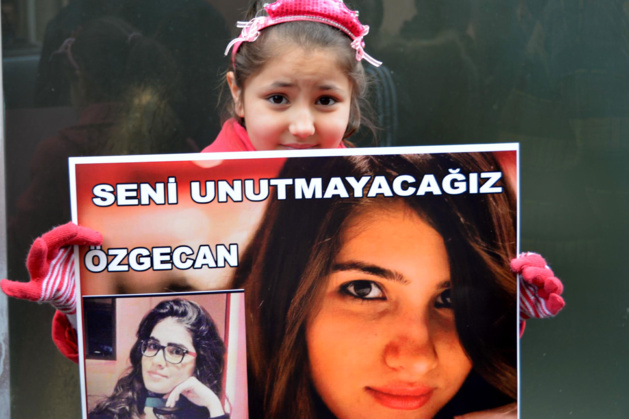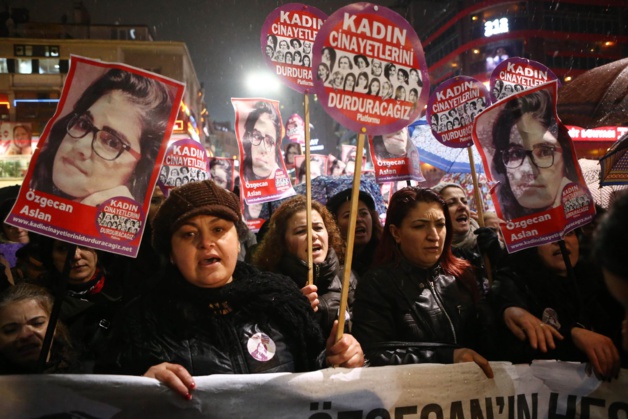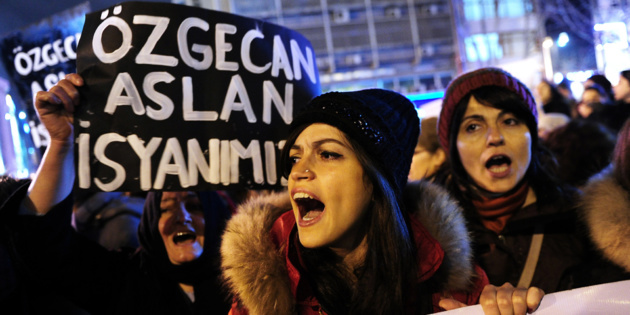
Credits AFP
Ms Aslan was returning home by bus when driver Ahmet Suphi Altındöken attempted to rape her. She fought back, but the driver managed to stab her before finally raping her, cutting off both her hands and burning her body to avoid leaving any traces of DNA. Two accomplices helped Ahmet in this extremely brutal crime, one of whom was Ahmet’s father. The three men were put under arrest on Monday, February 23rd. This murder, called barbaric by the Turkish people, has sparked many outcries. Turkish women are more and more afraid for their lives and a good number of crimes are reported to authorities every day. The killing of Ms Aslan appeared to be one crime too many, one that made Turkish society snap.
During Ms Aslan’s funeral, women defied a religious norm: traditionally men carry the coffin to the cemetery, but women at the funeral cried out that no man should touch or soil the body of the deceased. Therefore, women were the ones to carry Ms Aslan’s coffin and bury her, an act which the imam himself denied.
This student has become a symbol for the anger of Turkish women. Between February 14th and 16th, thousands of people took to the streets to express their discontent. On Febraury 18th, demonstrators numbered 15,000 in Mersin. In similar efforts, numerous appeals were posted on social networks in order for other victims of rape and sexual, physical or moral harassment to break the silence and the social taboo. The hashtag #sendeanlat has brought together many women’s testimonies. There, women tell personal stories or describe their own means of avoiding violent situations.
Violence towards women has increased in recent years
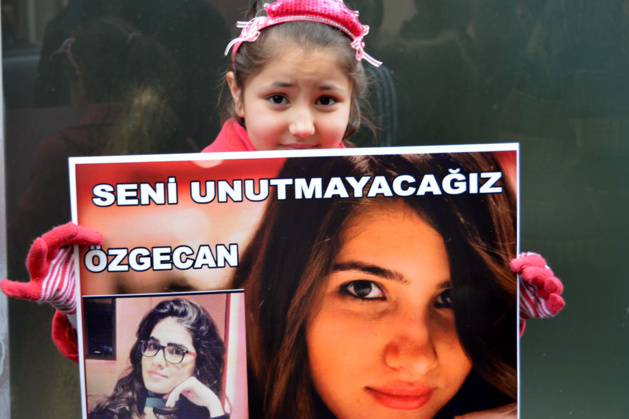
The murder of Ms Aslan has stirred and rekindled consciousness of a phenomenon which has become too recurrent in Turkey. On February 21st, men in Istanbul marched in skirts in order to denounce and condemn acts of violence towards women. The independent agency Bianet, which bases its findings on local and national media reports, counted 281 women dead at the hands of men in the year 2014. Including the last five years, this number reaches 1,134. Bianet has also observed that 70% of female murders are committed by a family member. In January 2015 alone, 26 women were murdered. Women’s advocacy agencies report the flaws of the Turkish judicial system which is more inclined to support offenders than to protect victims.
The demonstrations of the last two weeks have also taken a political turn, calling into question Turkey’s conservative Islamic government. Ayşenur İslam, the Minister of Family and Social Policy, has prepared to launch a nationwide effort against violence towards women. Leader of the opposition party, the Republican People’s Party (CHP), Kemal Kılıçdaroğlu, has attributed the rise in violence towards women to the religious "morality" and "mentality" of the Justice and Development Party (AKP) which has been in power since 2002. In addition, government ministers have asked for the return of the death penalty. For Celen Belge of Concordia University in Montreal, "the government was forced to condemn violent treatment of women and at the same time continued to insult protesters and belittle women. Turkish president Recep Tayyip Erdoğan thus hurled homophobic insults towards the men who marched in skirts against the murder of women".
It is important to recall the place and the status of women in Turkish society and earlier Ottoman society. Ottoman social structure framed women within a rigid and patriarchal traditionalism. The only role recognized for women was that of biological reproduction. In other words, the religious judicial order extremely limited women’s civil rights and social status. Faced with these limited rights, women quickly organised themselves. Since the second half of the 19th century, feminist consciousness has grown in Turkey in hopes of achieving equal civic and political rights for both sexes. Women earned the right to vote in 1934, 11 years before France. Even during the 1935 elections in Turkey, 10 women were elected as representatives. The place of women in Turkey has seen considerable progress in the 21st century and many important advances have marked the last 15 years. In 2001, the newly introduced Civil Code granted women an equal status with men, particularly in the context of marriage.
The female body in Turkey, an ideological battlefield
The growing discourse among different ministers in Erdoğan’s administration, in trying to define the role of women, favors the image of women as second-class citizens. Women are thus represented as weaklings who must be protected by men. In 2011, the Ministry of Women was renamed the Ministry of Family and Social Policy. In 2012, Erdoğan compared abortion to murder when expressing his wish to make it illegal. It should be noted that in Turkey, Voluntary Interruption of Pregnancy (VIP), up to ten weeks of pregnancy, has been authorised since 1983.
The bill which has caused outcry in Turkish society was dropped, but VIP was subsequently removed from online services offered by hospitals, making access to abortion difficult and complicated. In 2004, Erdoğan suggested criminilising adultery in Turkey in order to force women into the role of loyal and faithful wife. Erdoğan has tried several times to return women to their traditional job of generational renewal. Last February 4th, Minister of Health Mehmet Müezzinoğlu stressed this apparently natural place for women, stating that "maternity is not a career open to all….It is a career both unquestionable and sacred". On November 24th, 2014, Erdoğan described equality between men and women as "contrary to human nature".
In July 2014, Deputy Prime Minister Bülent Arınç strongly encouraged women to not laugh or chuckle in public in order that they "conserve their decency at all times". Faced with Erdoğan’s misogynist declarations, women from Turkey and all corners of the earth took pictures of themselves, grinning happily, and posted them on Twitter accompanied by the hashtags #kahkaha and #direnkahkaha.
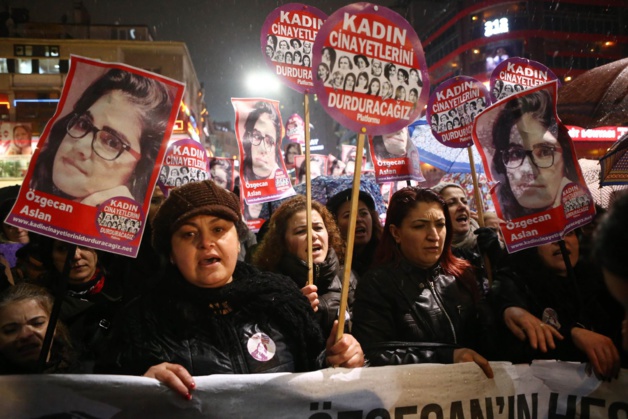
Turkish society has transformed these last decades, but the AKP is still trying to shape youth and revert to a traditional, religious morality. The homogenisation of youth comes mainly from rules of behaviour and more specifically from women’s attitudes. This is because the proposed moral order seeks to control the body of women, considered a reproductive body. According to Ceren Belge, Erdoğan is the first Turkish politician to promote inequality between the sexes, "which is unacceptable and contributes to an unhealthy environment for women. His many misogynist statements create the impression that it has become lawful to promote inequality".
In recent years, the Twittersphere has regularly been taken up by Turkish popular movements wishing to denounce the government’s religious moralism as well as its interference in the private lives of citizens. It is important to note that on March 20th, 2014, social networks such as Twitter and YouTube were censored. Ironically, this censorship had been announced by Erdoğan on his own Twitter account. The Turkish and international populations strongly criticise the Turkish government’s inaction in handling the escalating violence towards women. It is interesting to note that Turkey currently presides over the G20 summit, one of whose stated goals is to reduce the gap between women and men, particularly in employment.















